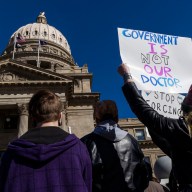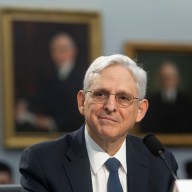By Yawen Chen and Se Young Lee
BEIJING (Reuters) – China on Thursday expressed confidence in striking a trade deal with the United States within their 90-day ceasefire period, praising the recent meeting between U.S. President Donald Trump and Chinese President Xi Jinping as highly successful.
In Argentina last weekend, Trump and Xi agreed to a truce that delayed the planned Jan. 1 U.S. hike of tariffs to 25 percent from 10 percent on $200 billion of Chinese goods while they negotiate a trade deal.
“We are very confident in reaching an agreement (with the United States) within the next 90 days,” China’s commerce ministry spokesman Gao Feng said in a weekly briefing, adding both sides have been communicating and cooperating “smoothly” since the leaders met in Argentina.
China’s ultimate goal during the 90-day trade talks is to remove all U.S. tariffs imposed on Chinese goods, Gao said.
His comments come as the arrest of a top executive of Chinese tech giant Huawei by Canadian authorities, on Washington’s request, threatens to spark a flare-up in tensions between the world’s two economic powerhouses once again.
The two countries have hit each other with tit-for-tariffs on goods worth hundreds of billions of dollars in sectors from automobiles to agriculture and energy, stymying trade and redrawing global supply chains.
Gao confirmed for the first time since the high-stakes meeting that China had agreed to implement consensus reached by both sides on agriculture, energy and cars, although he did not give details on any specific measures.
“We will start with agricultural products, energy, automobiles to immediately implement the issues that the two sides have reached consensus,” Gao said, when asked about what is on the negotiation agenda.
“Then, in the next 90 days, we will follow a clear timetable and roadmap to negotiate on issues such as intellectual property right protection, tech cooperation, market access and trade balance,” he said, stressing the consultations should be based on meeting the interests of both parties.
The White House has said China had committed to start buying more American products and lifting tariff and non-tariff barriers immediately, while beginning talks on structural changes with respect to forced technology transfers and intellectual property protection.
The United States has levied additional duties of between 10 percent and 25 percent on $250 billion of Chinese goods this year as punishment for what it calls China’s unfair trade practices. China has responded with its own tariffs.
“China and United States have reached very important consensus as both sides’ interests overlap,” Gao said. His comments echoed earlier remarks made by senior Chinese diplomat Wang Yi, who said the meeting was “friendly and candid” and would help to avoid further trade tensions.
“All of these help to safeguard China’s legitimate interests, and are also in the interests of the United States, and even more are in line with the expectations of the international community,” he added in a statement carried on the foreign ministry’s website.
LINGERING DOUBTS
But global markets have been nervous about the prospects of a Sino-U.S. trade dispute spilling over to growing rivalry between both sides in areas such as technology, and many economists have remained cautious about being too optimistic on a temporary truce.
The daughter of Huawei’s founder is facing extradition to the United States, dealing a blow to hopes of an easing of Sino-U.S. trade tensions and rocking global stock markets.
Trump also warned this week of more tariffs if the two sides could not resolve their differences.
Hannah Anderson, Global Market Strategist at JPMorgan Asset Management, said there was a lot of uncertainty over the U.S.-China relationship now as both view each other more as a competitor than a strategic partner in trade and economics.
“When it comes to the trade policies that have been proposed so far specifically, I think we can all expect that there will be further tariff increases on U.S. imports of Chinese goods, whether that’s within the 90-day window that we are now operating under a pause or outside that window,” Anderson told a small group of reporters in Beijing on Thursday.
(Reporting by Ben Blanchard, Se Young Lee, and Yawen Chen; Additional reporting by Adam Jourdan in Shanghai and Ryan Woo; Writing by Yawen Chen; Editing by Michael Perry and Jacqueline Wong)


















